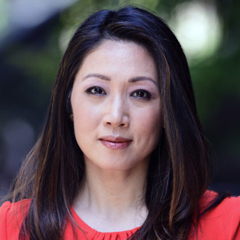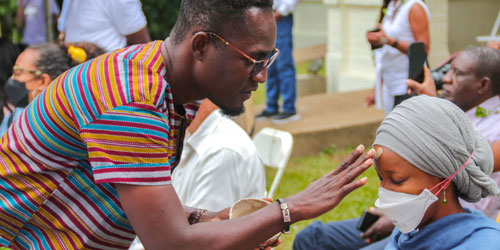Inhe Choi, EunSook Lee, Ai-jen Poo, and Stephanie Sy reflect on the history and impacts of anti-Asian hate and violence and how they grapple with its harms.

John Palfrey, President
Earlier this week, we witnessed another senseless and horrific killing of eight people in Atlanta, six of whom were women of Asian descent. We stand in solidarity with our Asian and Asian-American grantees and partners, for whom this act of violence must be particularly upsetting and galvanizing.
This latest act of anti-Asian violence brings to mind several important facts. One is that we are far from out of the long shadow cast by the hateful rhetoric of the previous presidential administration in the United States. We continue to see individuals motivated by or sympathetic to White supremacist rhetoric routinely drawn into acts of hatred and violence. A recent Center for the Study of Hate and Extremism study found anti-Asian hate crimes surged nearly 150 percent in 2020, while overall hate crimes decreased by 7 percent. Among all violent attacks on Asian Americans over the past year, nearly 70 percent have been against Asian American women, according to a recent study by Stop AAPI Hate. Second, we know that racism and hate affect many individuals and groups in our society in a multitude of ways. In addition to the direct harms to the women and their families in Atlanta, these acts cause harm by spreading fear and worry among Asian American Pacific Islander (AAPI) communities across the nation.
We invited women leaders of our grantee organizations who are actively working in, and reporting on, AAPI communities to share their reflections on the individual and collective impacts of the wave of anti-Asian hate and violence and how they are seeking to address such harms. Take a look at their personal reflections, then consider how you can join us and so many others in this ongoing work to address the challenges of racism, misogyny, and xenophobia in our country today.

Stephanie Sy, PBS NewsHour correspondent and anchor of PBS NewsHour West
“It’s hard to get anyone to care about Asians,” a fellow Asian American told me as I was about to embark on a reporting trip to Oakland, California to cover a recent spate of anti-Asian attacks. I did not have to ask what she meant. Anti-Asian racism has existed in codified and casual forms throughout U.S. history, and yet I knew going into the assignment that the challenge would be to get people to care; to get them to see beyond the stereotype of the “model minority” and see the vulnerabilities that have been laid bare since political rhetoric around the pandemic put a bullseye on our backs.
There are two geopolitical realities affecting Asian Americans—while Democratic lawmakers and commentators have rightly focused on President Trump’s xenophobic rhetoric around the pandemic as being an original source for the fount of anti-Asian racism we have experienced in the last year, there is another reality: the increasingly adversarial relationship between the U.S. and China. I lived in China as a journalist more than a decade ago and was never considered Chinese. I was born in the U.S., and, the problem is, I have never felt fully considered American either. Just as Japanese Americans were seen as the foreign enemy during WWII and interned, I worry that pervasive ignorance will see a repeat of history, but for Chinese Americans. For the record, my parents are from Taiwan.
As a female Asian-American TV newscaster, I am sometimes self-conscious that I have chosen an occupation that may play into existing stereotypes about Asian women. Was it the White male gaze that helped earn me my place, and do I deserve it? Have I also been complicit somehow in the fetishization that likely contributed to the murders of the six Asian women working at the Atlanta massage parlors?
All these thoughts and questions have been keeping me up at night, even while I am self-conscious about taking up too many words, too much oxygen in the conversation about race in America. There is a phrase in Mandarin—"eat bitter”—swallow it...over and over.
Being Asian American is being stuck in what writer Jay Caspian Kang recently called a “prismatic neuroses,” where “you’re thinking about everyone else but nobody else is thinking about you.” I am still in the process of figuring out what I want to say even now, how to get the harassment, discrimination, and deaths to stop. How to get people to care.
John Palfrey talks to Ai-jen Poo, a 2014 MacArthur Fellow and the co-founder and Executive Director of the National Domestic Workers Alliance, about the need to create policies and systems that keep people safe and recognize our humanity.

EunSook Lee, Director, AAPI Civic Engagement Fund
Since our inception, our strategy has been to boost the capacity of local AAPI groups to educate and organize at the grassroots, advocate for systems change, and promote AAPI voices and stories that shift the one-dimensional and toxic narratives of AAPIs. March 16 reminded us that the multiracial and just society that we seek to build cannot be achieved without confronting—and dismantling—White male supremacy in America. Racism and discrimination have been codified by law and manifested for over a century, from the Rock Springs Massacre in Wyoming to the killing of Vincent Chin in 1982.
Atlanta brought to light the added dimension of misogyny, which is experienced uniquely, if not differently, by AAPI women and women of color. Our response must be different this time. The work that AAPI organizations on the ground do and continue to do will center on the needs and perspectives of our community. It will shine a spotlight on victims and their families, and we will continue to call for greater investment in education, cultural awareness, and long-term policy and systems change that protects rather than over-criminalizes communities and includes restorative justice approaches. The time is now for all of us to accelerate the mobilization and engagement of AAPIs, in alliance with Black, Indigenous, and other communities of color, toward intersectional justice and the just and free future we all seek.

Inhe Choi, Executive Director, HANA Center
Our hearts are with the families, friends, and communities impacted by the mass killing in Atlanta, Georgia.
This atrocity is particularly hurting our Asian American community that already has been struggling to protect ourselves and our loved ones from the spread of COVID-19 and the growing violence fueled by anti-Asian hate, White supremacy, and anti-immigrant policies.
The killing of six Asian American women was targeted violence that accentuates the culture of sexualizing Asians. There is a long history of fetishizing Asian women as disposable commodities that has led White men to exploit, traffic, rape, and murder Asian women without accountability in the U.S. and in Asian countries, where the sex industry around U.S. military bases proliferated.
For Asian American women, we are well aware that imperialism, militarism, and corporate greed dehumanize, displace, and target us. We also know that White supremacy, gender-based violence, and misogyny led to the violent loss of lives in Atlanta. There needs to be accountability with a clear understanding of the underlying causes of the violence.
This mass shooting is also part of a larger story of marginalized communities terrorized by anti-Black racism and xenophobia including ongoing police murders of Black, Latinx, and LGBTQ+ people and deportation of immigrants. There are 11 million undocumented immigrants, including 1.7 million Asian Americans, who are forced to live in the shadows. Thousands of intercountry adoptees, over half of whom are of Asian heritage, are undocumented despite being adopted by U.S. citizens. This is state violence, in the form of deportations and refusal to recognize one’s belonging to a country. Congress must legislate a pathway to citizenship for the 11 million undocumented immigrants and end detention and deportation.
In order to heal and rebuild, we must have our local, state, and federal governments invest in sustained programming for physical and mental health and in legal, employment, and immigration services to immigrants, women, and communities of color.



